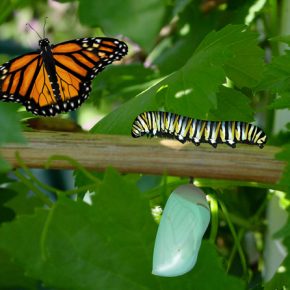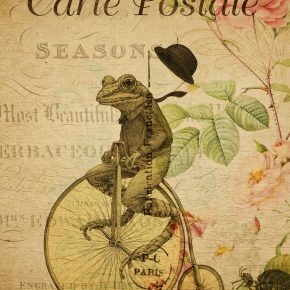This month’s submissions relate to various parts of our life cycle, various issues and challenges that we tend to try to accomplish at different points in life.
Historical psychologist Erik Erikson identified ten different life stages and described the decisions people make and the skills they master at different times in their lives as ‘crises.’ I don’t think normal stages of life have to be considered crises, but they do come with some creative tension as we try to figure out different things at those ages.
We’re not going to go through all ten of the stages Erikson pointed out, but this issue does explore several of them, which we’ll describe in ordinary language. Many of these stages overlap, both in real people’s lives and in these submissions.
Right away, starting as infants, we figure out whether we can trust others in this universe. Are we safe here? Will others care for us?
John Chisoba Vincent looks at the tension between communal care and responsibility and individual privacy and freedom in his poems. In different works his speakers assert that matters are ‘nobody’s business’ or ‘everybody’s business’ while illustrating the vast nature of the social problems in his home country of Nigeria.
Michael Robinson reflects on the solace and belonging he has found through romantic, spiritual and family love and how that has sustained him in an often harsh and violent world.
Next, we often work to develop a sense of identity, where we figure out who we are and how we’re going to be in this world.
Jonathan Hine’s single, short piece bursts forth in an assertion of existence, full of light and sound despite its ambiguous title.
In Elizabeth Hughes’ monthly Book Periscope column, the titles she reviews grapple with consciousness and existence. Protagonists of G.R. Jerry’s Tom and Lovey and Coulter’s A Night’s Tale exist in the space between reality and the supernatural. Greg Payan’s memoir Please Stay details his wife’s journey back from a nearly fatal brain aneurysm, and M.H. Howington’s The Redhead presents a mystery where we aren’t sure which characters are the villains or the victims or heroes until the end.
J.D. DeHart’s poems claim his own, and his various speakers’, identities in serious and extravagantly comical ways, along with reminding us of the dignity and value of women. Mahbub’s poetic speakers all belong to and participate in their world: the home country of Bangladesh, the natural world around them, the drama of a musical production. Yet we see struggle here, as his final piece presents a woman who murders in a rage after being rejected in her marriage.
Christopher Bernard reviews Chicago theater company Manual Cinema’s production of Ada/Ava at UC Berkeley’s Zellerbach Hall, which portrays a young lighthouse keeper who never quite recovers from the loss of her best friend and identical twin and thus never completely develops an identity separate from her sister’s. In the eighth installment of his novel Amor I Kaos, Christopher Bernard’s characters waver between taking care of and accepting practical realities of physical existence and drifting off into worlds and meta-worlds of thought and ponderment on being human in our universe.
Many of us later move into developing intense romantic relationships and friendships.
Sheryl Bize-Boutte’s short autobiographical essay celebrates a friendship that started in childhood and deepened in adulthood until the tragic death of her friend Cassandra at a young age from cancer. This piece explores identity as both Sheryl and Cassandra look into the implications of Cassandra’s mixed Japanese and African-American heritage, and also, sadly, serves as a reminder of our mortality.
Vijay Nair’s short story intellectualizes romance and physical love in a humorous but thoughtful argument among literary friends – and the winning position becomes apparent in a tenderly dramatic moment near the end. Chimezie Ihekuna’s essay on marriage dynamics points out the necessity of couples’ getting on the same page together and entering into a marriage with similar expectations. Vijay Nair celebrates both the sensual and intellectual aspects of love while Chimezie Ihekuna acknowledges the role of physical love, yet prioritizes the spiritual and emotional connection.
And, perhaps more so as we age, but really at any time throughout our lives, we figure out what we’re going to do, what skills we’re going to develop and what we’re going to take away from our experiences. Will we develop wisdom or give in to despair, continue to pursue creativity or fall into stagnation, work towards what we can accomplish or get stuck focusing on what makes us feel inferior?
Ryan Quinn Flanagan’s poetry confronts aging and identity in ways that are alternately humorous and poignant. We see nostalgia for drive-in movies, Beatles music and young love alongside comical pieces where the protagonists become a wild array of alternate beings juxtaposed with a piece musing about what he ‘should’ be after a certain age.
J.J. Campbell returns to our site with his familiar jocular cynicism, expressing a jaded view of aging, religion, and human nature in general. Joan Beebe’s pieces present a different perspective, as she’s a senior full of excitement about life’s possibilities. In her poems, trains take passengers to all sorts of wondrous destinations and Disney World still holds magic for adults.
Chimezie Ihekuna’s poetry deals with the quest for real, authentic truth and the meaning of life, and how easy and how frustrating it is to get sidetracked on that quest and get stuck with cheap substitutes for real meaning. J. Dorroh’s work, more visceral than Ihekuna’s, celebrates science and intellectual understanding at the same time that he illustrates a gut-level sense of wonder and curiosity that goes beyond pure rationality. Also, like John Chisoba Vincent, he critiques social problems through grotesque metaphor, with a piece on the decay of the United States.
Joe Grochalski’s work also expresses annoyance at those his speakers feel have a shallow understanding of life: inane tourists, an overly talkative neighbor, and people who try to be socially aware yet turn their outrage to issues of lesser importance. On a deeper level, Grochalski’s pieces question our identities and the impact of our family legacies and how much power we have to alter or escape them, and also suggest that his speakers may be more easily angered because they have become disillusioned with their lives with age.
Throughout our lives, many of us turn to writing and art to record, communicate and better understand what we’re experiencing psychologically. And we hope that this issue and its submissions helps you to accomplish that.


